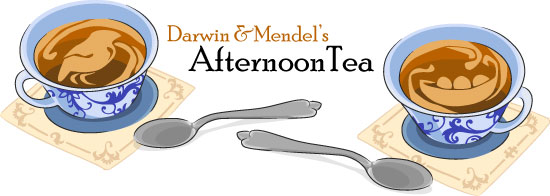
Illustrated by: Sabine Deviche
show/hide words to know
Long after his remarkable five year journey on the ship the HMS Beagle, Charles Darwin (February 12, 1809 – April 19, 1882) described the ideas that had been brewing in his mind about how natural selection worked in his book On the Origin of Species. Around the same time, the Benedict monk Gregor Mendel (July 20, 1822 – January 6, 1884) had figured out how offspring inherit traits from their parents. His concept of heritable characteristics, which scientists would later call genes, differed greatly from the common ideas of inheritance at the time. In Darwin’s day, people thought that traits from parents are blended in their children—a view shared by Darwin.
The following conversation between the two great thinkers, Charles Darwin and Gregor Mendel, is imaginary. While such a meeting never took place, the monk Mendel had read Darwin’s work. Mendel’s amazing insight into how genetic information is passed to offspring was only rediscovered many years after his death. We will never know what course biological research would have taken had the two men interacted at the time. Mendel’s work would have reinforced Darwin’s argument that a new beneficial mutation could spread throughout a population without being diluted by the leading traits already present in the population. We can only guess that such a conversation would have proved illuminating to both participants.
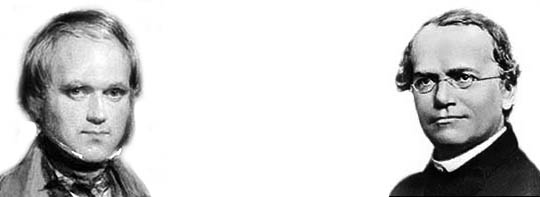
A young Charles Darwin (left) and the Augustinian monk Gregor Mendel (right)
A Modest Monk Calls at Darwin’s Down House
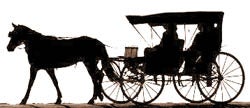
A black carriage drawn by a prancing chestnut horse bounds down the packed dirt lane lined with trees, pulling into the graveled circular drive in front of a large country estate. Ivy and yellow climbing roses weave their way through the trellises beside the inviting entrance and along each window. The large door swings open and a butler steps out. The driver sitting atop the carriage pulls on the reins and stops the horse in front of the house. A pale round face behind wire-rimmed spectacles peers out of the carriage’s open window.
Mendel: “Ach Du Himmel. Have we finally arrived?” he asks the driver sitting in front.
Driver: “Yes, Sir, we have. This is Down House in Kent. Home of Charles Darwin and his lovely wife Emma.”
Butler: “You must be Gregor Mendel.” Bowing slightly at the waist and lowering his eyes, “Welcome. We have been expecting you. Have you any bags?”
Mendel: Stepping out of the carriage, he brushes the dust from the road off his religious garb. “Ja, ja. Why thank you. Just the one bag. I can manage that. I’m used to carrying my own things at the Abbey.”
Butler: “Indeed, sir. Step this way please. I will let the master know you have arrived.”
Mendel tips his hat at the driver and then picks up his bag and follows the butler into the house. Their steps echo in the large entrance hall.
Alerted by the sounds, a woman peeks out from behind one of the other doors. Brown ringlets frame her reddened cheeks and warm smile. A shawl drapes over her shoulders.
Emma Darwin: “Gregor Mendel,” the woman says. “So glad you made the journey. My husband has been looking forward to meeting you. He’s out puttering in his shed. You’ll have to forgive him. His work so fascinates him, he loses all track of time. I believe he’s tinkering with those pigeons of his again. Or maybe he’s looking at barnacles.”
Mendel: “He sounds like a man after my own heart. I, too, forget the hours as I work in my garden.”
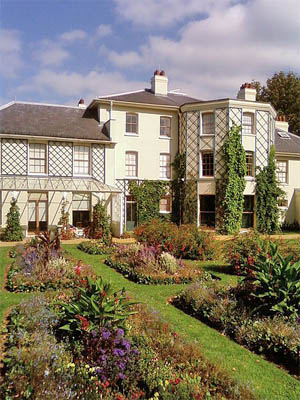
Down House Garden - Wikimedia
Emma: “I had heard you were keen with plants. Charles suggested tea in the garden would be most appropriate. It’s a humble plot, but it serves us well. Fresh vegetables and herbs. And a cutting garden to bring some color into the house. I’ll show you the way while the butler fetches my husband. You can leave your bag here and I will have one of the boys place it in your room.”
Mendel: “How very kind of you, Madam.”
Emma: “Just this way,” she says, heading through the house and out a side door into the back yard.
The two step out into the warm summer day. To one side several children play a game, trundling a wooden hoop with a stick. As the hoop slinks away from the stick, wobbles and falls to the ground, a short cry of dismay is heard.
Emma: “I try to let the children have a good run in the sun when the weather permits. Not often that we have such a nice clear day here in England.”
Emma leads Mendel past the garden plot toward a table set for tea in the shade of a large oak tree. But he stops to finger her snapdragons along the way.
Mendel: “My, how your garden blooms. Such lovely color. I myself have been tinkering with pea plants. Purple and white flowers, short and tall plants—nothing so beautifully striking as your garden. The vibrancy in your flowers is breathtaking.”
Meeting of Majestic Minds
Just then a tall, slender figure emerges from a shed. Smoothing his hair down with one hand, he strides toward his wife and Mendel.
Darwin: “Brother Mendel, how good of you to visit. Do sit down, I beg of you.”
Mendel: Ach Du lieber Gott, ja, ja. How very kind of you to invite me to your home. Such a lovely place. The climbing roses reminds me of the garden walls where I toil away most of my days. My home, the Augustinian Abbey of Old Brno in the Austrian Empire is a quiet, relaxing place. Much like this.
Emma: I’ll leave you two to talk amongst yourself. Please excuse me.
The two men watch her depart. Darwin gestures that Mendel should take a seat. The two sit down at the round table.
Darwin: A relaxing place. Yes, it is nice to have a place of your own to think. Let ideas stew and develop, work out the finer points that trouble the theories brewing in one’s mind. On the HMS Beagle, I had little time to think. The seas were so rough and my stomach never did adjust.
Mendel: I prefer travel on land myself.
Darwin: Yes, that was always a respite. Whenever we went ashore, I worked from dawn to dusk collecting. It wasn’t until I came here to Down House that I had time to think and reflect on all I had seen. But where are my English manners. How rude of me to jabber away when I have yet to offer you tea. Do you take milk? Sugar?
Mendel: Milk in tea! Nein Danke, I mean to say, no thank you please.
Darwin pours Mendel a cup of tea from a sapphire blue Wedgewood teapot received as a gift from Emma’s family, makers of the renowned pottery. A dark tea almost the color of strong coffee streams into the cup.
Mendel: My, my, you English do brew a strong cup of tea. Have you any honey by chance? In Old Brno two brothers tend our apiary of hives. I must admit I have acquired the taste for honey to sweeten my drinks. But if you have none at hand, I will enjoy the sugar instead.
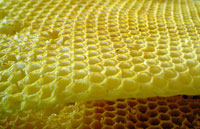
Bee honeycomb - Wikimedia
Darwin: In a country village like this one must keep a few hives. The bees do such a wonderful job of pollinating flowers, but they do vex me at times. How can they function so well as a unit? And why do the bees stay and work in the hive for the good of another? Would you like some shortbread? Perhaps a scone?
A Cup of Tea, a Cookie and a Mouthful of Revelations
Darwin holds a delicate plate of rectangular shortbread cookies toward Mendel, who takes one and tastes it.
Mendel: Hmm, delicious. Rich with butter. You were saying about the bees.
Darwin: My good friend, the local vicar John Innes helped me erect a hive of glass right here at home. This has proved remarkably interesting. I can sit and watch the activities of hundreds to thousands of individuals constructing new comb, each adding a little here and a little there.
Mendel: A hive of glass. That must be quite a sight!
Darwin: It is. I have learned a lot by watching their actions. I am quite sure their instinct to build those extraordinarily beautiful and perfect hexagonal combs evolved in small steps over millions of years. Ah, but they do vex me, those wonderful instincts of the social insects! For I can not currently see by what means they learn how to build such a perfect hexagon.
Mendel: I can see how that would prove vexing. They do seem to be the most precise of carpenters, working with wax instead of wood.
Darwin: Yes, How true. I am certain they acquired this instinct by the process of gradual addition, through natural selection. A slight improvement here. A little refinement there. I truly believe that "the most complex and perfect instinctive actions, wondrous though they be, have been slowly acquired and perfected" (Prete). But here I am letting ideas carry me off again. You asked for honey and it shall be yours. The spring wildflower blend is truly delightful this year. Do try some.
Darwin passes a small pot of honey to Mendel, who dribbles a small amount of the golden liquid into his cup and also onto the remainder of his shortbread cookie.
Mendel: Ah this honey is most delightful, summer sunshine captured for a winter’s day. I can understand your frustration with the social insects. Just as they have vexed you, I have been confounded by simple pea plants. Perhaps that is why my hairline is receding. I’ve probably torn out more than a few strands in frustration.
Darwin: Pea plants? Really, how intriguing. I’m more a barnacle man myself. But do go on.
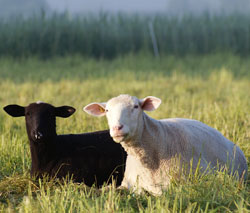
Black and white sheep - Wikimedia
Mendel: Those pea plants had me mystified. But I have finally cracked the nut, so to say, or better yet, I have split the pea pod! [cracking an ever so slight smile] I am sure you have witnessed many times yourself that a shepherd will have a lovely herd of snow white lambs. Yet these lovely white, wooly creatures will on occasion throw a black baby, to the annoyance of the shepherd, for their fleece has no value at all.
Darwin: Gesturing at the landscape surrounding them, Darwin replies: Yes, as a country gentleman here in Kent I am well aware of the difficulties such throwbacks cause.
Mendel: Well, I have come across something most surprising in my humble garden plot. You see, I have been crossing true breeding pea plants that bloom in white or vibrant purple. I simply take on the role of honey bee or butterfly and deliberately spread the pollen from the anthers of a purple pea plant onto the stigma of a white pea plant.
Darwin: I see, you cross pollinate.
Mendel: Ja, ja, exactly. I then gather the pea pods produced to harvest the seeds and plant these again. What I have found is if I cross pollen from a purple plant onto a white plant, the peas will all grow into purple plants. And the same is true if I cross the pollen from a white flower with a purple flower. Again, all the peas produced from such a conjunction will grow into purple plants.
Darwin: By Jove, that is most interesting. I would have expected blending to occur. When a tall man marries a short woman, their children are most often of intermediate size. What you describe would be as if all the children would grow to be tall. You do surprise me! Please go on and tell me more. You have raised my curiosity.
Mendel: Remember those black lambs. Well the same occurred with my pea plants. I took those offspring from the purple and white cross, the pea plants that all bloomed purple.
Darwin: leaning forward with attention: Yes, do go on.
Mendel: Well I self-pollinated that first generation of offspring. And the peas I harvested and planted too. The second generation of offspring were a motley bunch.
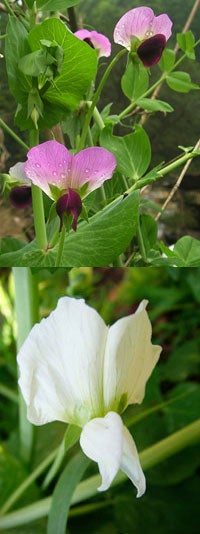
Pea flowers - Wikimedia
Darwin: Let me be sure I am following your line of action. You took the pollen from the offspring of the first cross, which were all purple, and used that pollen to fertilize the flowers of those same plants?
Mendel: Exactly, my dear Charles. I crossed those purple flowers with themselves. Can you guess what I found?
Darwin: Some white flowers! But you gave that answer away with the story of the lambs.
Mendel: Yes, I did. But what was most interesting was that I repeated this experiment many, many times. I crossed white flowered pea plants with purple flowered pea plants. I crossed peas that produced yellow peas with peas that produced green peas. I even crossed smooth skinned peas with wrinkly ones! And each and every time the same thing happened.
Salivation, Anticipation and Simple Addition
Darwin: Well do tell me, Gregor! You have me salivating with anticipation.
Mendel: Well I counted and I counted and I counted. When I went to university in Vienna, I had a most excellent physics professor. He insisted that experiments aimed at understanding nature must rest on mathematical models.
Darwin: What an unusual position.
Mendel: Yes, it is, but it has served me well. Now what I found was that each time three-quarters of the offspring would be purple and one-quarter would be white. If I took those white plants and crossed them with each other, I produced only white plants. But if I self-crossed the purple plants, some would produce only purple plants, while others produced an equal number of white and purple plants.
Darwin: Most curious, but what does it mean?
Mendel: I surmise that it must mean heredity is of a much different nature than we originally believed. Each parent must contribute an equal share of the heritable characteristic. But the catch is that each parent must pass on to its offspring a certain version of the same heritable characteristic.
Darwin: That does sound interesting.
Mendel: But wait, there’s more. So if a pea plant inherits one “dominant” version of the heritable characteristic, such as purple flower color, it displays that trait, even if it inherits a recessive version like white flower color from the other parent. Only if both the mother and father pass on the recessive version for flower color, will the plant have white flowers.
Darwin: Well, I guess that would explain why you only produced white offspring when you crossed white flowers with white flowers.
Mendel: That’s right. It’s those funny purple plants that have both white and purple offspring that led me to my conclusion. Those plants don’t breed true because in reality they must be carrying one purple and one white heritable characteristic. Those pesky, wonderful plants are what caused so much trouble in my breeding experiments.
Darwin: Trouble indeed, but trouble that has spurred some interesting ideas. I am truly astonished by what you have revealed. I will need time to think and reflect on what you have said. You must be tired after your travels. Why don’t we adjourn for now and you can rest. We shall talk again after you have had a chance to relax and I have pondered these results. Your ideas would certainly help explain why those black lambs keep reappearing, despite the best efforts of shepherds to cull them from their stock!
References:
1. Mendel was familiar with Darwin’s work.
What Darwin Didn't Know: Gregor Mendel and the Mechanism of Heredity. In PBS Evolution Library. Retrieved from http://www.pbs.org/wgbh/evolution/library/06/1/l_061_01.html(link is external)
2. In reality Mendel did not speak English, which may be why he never wrote to Darwin.
Fairbanks, D.J., Rytting, B. (2001). Mendelian Controversies: A Botanical and Historical Review. American Journal of Botany, 88(5). Retrieved from 737-752. https://www.ncbi.nlm.nih.gov/pubmed/11353700(link is external)
3. Prete, F. R. (1990). The Conundrum of the Honey Bees: One Impediment to the Publication of Darwin's Theory. Journal of the History of Biology, 23(2), 271-290.
4. Today this heritable character is called a gene.
View Citation

Scientists depend on the work of others to develop ideas and complete studies.
Be Part of
Ask A Biologist
By volunteering, or simply sending us feedback on the site. Scientists, teachers, writers, illustrators, and translators are all important to the program. If you are interested in helping with the website we have a Volunteers page to get the process started.








